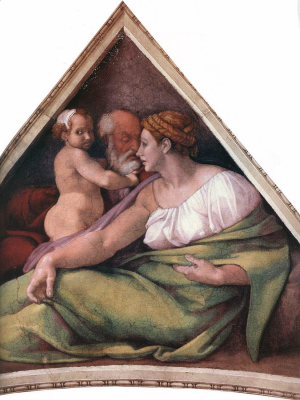Meaning of Numbers: The Number 128
The English phrase "hundred and twenty and eight," used for the number 128, is not recorded in the King James Bible.
The possible meaning of the number 128 is derived from the occurrences of certain words in the Bible's original languages and in the King James translation.
The Hebrew word mispar, Strong's #H4557, is found in 128 Hebrew Old Testament verses. It is recorded the most in the book of Numbers (34 times) followed by 1Chronicles (19). It is usually translated as the word "number" in the King James translation. Its first use is in Genesis while its last use is found in the prophetic book of Joel.
And Jacob said to Simeon and Levi, Ye have troubled me to make me to stink among the inhabitants of the land, among the Canaanites and the Perizzites: and I being few in number (mispar), they shall gather themselves together against me, and slay me; and I shall be destroyed, I and my house (Genesis 34:30, KJV).
For a nation is come up upon my land, strong, and without number (mispar), whose teeth are the teeth of a lion, and he hath the cheek teeth of a great lion (Joel 1:6, KJV).

Appearances of Number One Hundred Twenty Eight
The English name "Hezekiah" appears 128 times in the King James Bible. Hezekiah, who assumed the throne at age 25, was the second from last righteous ruler to reign over the Kingdom of Judah. It was during his reign that the Assyrian Empire, who had taken the northern ten tribes into captivity, sought to also conquer Judah.
Now in the fourteenth year of king Hezekiah did Sennacherib king of Assyria come up against all the fenced cities of Judah, and took them (2Kings 18:13, KJV).
And the rest of the acts of Hezekiah, and all his might, and how he made a pool and a conduit, and brought water into the city, are they not written in the book of the chronicles of the kings of Judah? (2Kings 20:20, HBFV).
The English word "border" is recorded in 128 KJV verses. It is found the most in the book of Joshua (56 times) followed by Ezekiel (37). Its first Biblical appearance is in the famous "table of nations" found in Genesis 10 which reveals where many (but not all) of Noah's descendants migrated after the flood.
And the border of the Canaanites was from Sidon, as thou comest to Gerar, unto Gaza; as thou goest, unto Sodom, and Gomorrah, and Admah, and Zeboim, even unto Lasha (Genesis 10:19, KJV).
The Lord will destroy the house of the proud: but he will establish the border of the widow (Proverbs 15:25, KJV).
Psalm 128 contains a promise that the Lord will bless those who respect (obey) him.
Your wife will be as fruitful as a grapevine, and just as an olive tree is rich with olives, your home will be rich with healthy children. That is how the Lord will bless everyone who respects him (Verse 3 of Psalm 128, CEV).
Number 128 and Eternity
The Greek word aion (Strong's Concordance #G165) is used 128 times in the original Greek of the New Testament. It is written the most in Revelation (28 times) followed by the book of Hebrews (15) and then the gospel of John (13).
The modern English word "eon," which can represent an immense or indefinitely long time period, is derived from aion.
Aion can be used to describe a long span of time such as an age or the period of time the world has existed before the return of Jesus. It can also be used to define an unbroken period that goes from the present to eternity.
This is the way it will be in the end of the age (aion): the angels shall go out, and shall separate the wicked from among the righteous (Matthew 13:49, HBFV).
And he (Jesus Christ) shall reign over the house of Jacob for ever (aion); and of his kingdom there shall be no end (Luke 1:33, KJV).
Interestingly, and uniquely in Scripture, there are many times when the word aion is used twice, right next to each other, in a single verse. It is even used three times in a single sentence in the book of 1Timothy!
Now unto God and our Father be glory for ever and ever (eis aion aion). Amen (Philippians 4:20, KJV, see also Galatians 1:5, Ephesians 3:21, 2Timothy 4:18, Hebrews 1:8, 13:21, 1Peter 4:11, 5:11, Revelation 1:18, etc.).
Now unto the King eternal (aion), immortal, invisible, the only wise God, be honor and glory for ever and ever (eis aion aion). Amen (1Timothy 1:17, KJV).
More Info on Biblical Meaning of 128
There are 2 words and phrases in the Bible's original languages that are recorded exactly 128 times.
128 is equal to 2 x 2 x 2 x 2 x 2 x 2 x 2 (or 2 to the seventh power). Two is considered a prime number.
128 is the only three digit number that can be represented by the seventh power of another number.
Secure communications over the Internet (the "https" of an Internet URL, the "s" standing for "secure") are achieved through what is called 128 bit encryption. Encryption makes it quite difficult for anyone to view and steal information (e.g. credit card numbers) sent from computer to computer.
128, in the binary code of computers (0's and 1's), is represented as "10000000" (a one followed by seven zeros). This sequence is composed of 8 bits which is commonly referred to as a byte. Since one byte can represent values from 0 to 255 (binary "00000000" to "11111111") it was used in early computers to represent a single character of text.